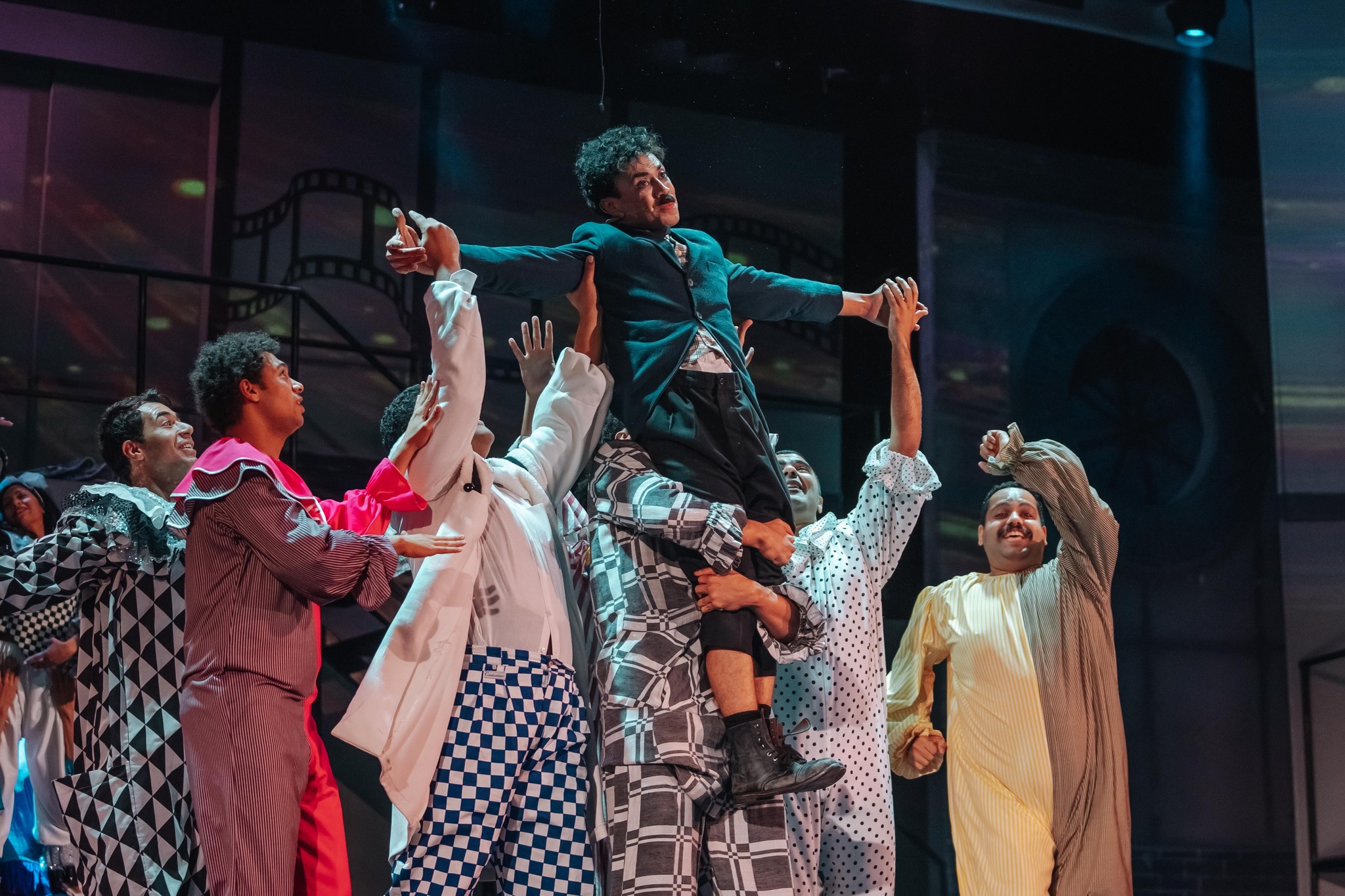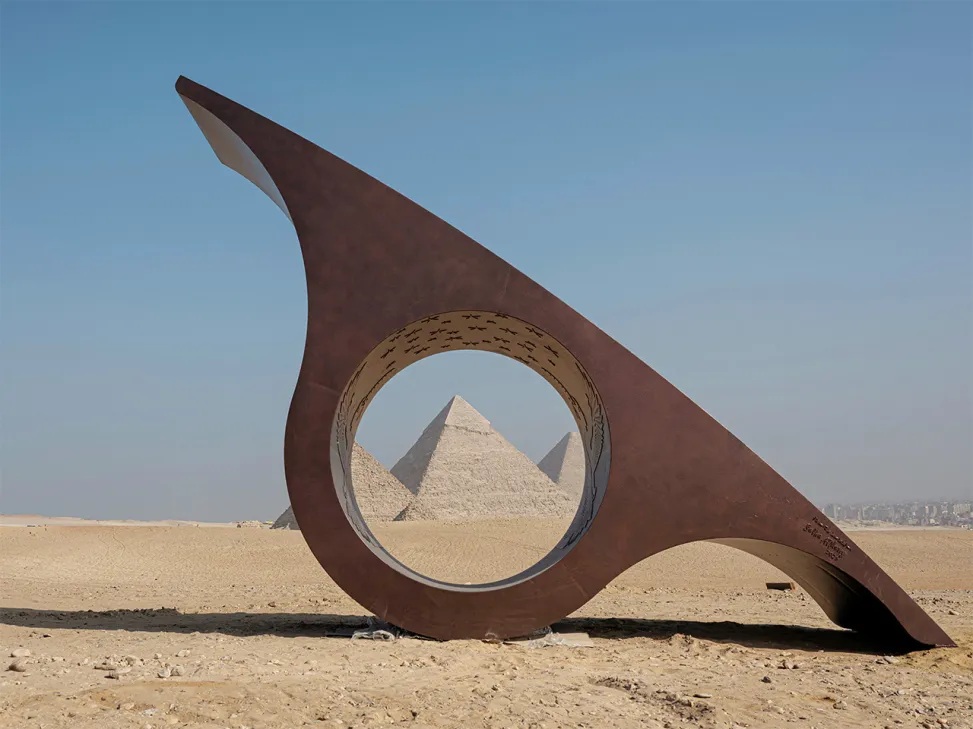You may have seen the billboards and wondered. I know I did. A towering image of a group of people dressed in early 20th century Western attire, one of them ostensibly resembling the iconic British comedian and filmmaker, Charlie Chaplin. Emblazoned in golden letters across the foreground: Charlie.
Was this a film? Its billboard hung high over a busy road, where one would normally see ads for Egyptian blockbusters, but it was nowhere to be found on movie theatre schedules. Not until I saw an ad for it on social media did I realise that this was, in fact, a play – a musical production titled ‘Charlie’, which would run for one night in Teatro Akran, Sheikh Zayed.
Not having a clear idea of what this production had to offer, I had not planned on going until I was invited by family. With ticket prices ranging from EGP 450 (USD 15) for the nosebleed seats all the way to EGP 2000 (USD 65), I imagine many would not consider it an affordable night out.
This was clearly no independent production in a small, unassuming theatre. Though the stage was small, the theatre’s presence in a trendy plaza in an affluent satellite neighbourhood of Greater Cairo was telling. The script and lyrics of the musical had also been written by none other than Medhat El-Adl, a well-known, celebrated writer, and member of the El-Adl family, whose name and media production company are a staple in the Egyptian entertainment industry.
I tried not to let any of this affect my expectations. After all, producing a musical is no mean feat, not to mention that not many musicals are made in Egypt. The experience, resources, and knowledge to create something truly outstanding are probably tricky to come by.
The musical’s social media pages have since announced that ‘Charlie’ would be performed again in Teatro Arkan on 3 March, in addition to future performances in Dubai, London, and New York.
If you are wondering whether snagging a seat will be worth your time and money, perhaps my experience will help you reach a decision.
The Performance
In jazz outfits and spat-like shoes, a group of dancers opened the show, ushering in four singers performing the opening title: a song whose melody was clearly and cleverly inspired by Charlie Chaplin’s iconic ‘Nonsense Song’. As I listened to the lyrics that spoke lovingly of cinema and Chaplin himself, I grew a suspicion regarding the singers, but chose to give them the benefit of the doubt for the time being.
Almost entirely made up of musical numbers composed by Ihab Abdel-Wahed and performed by a troupe of about 15 to 20 dancers, the musical told the story of Charlie Chaplin’s life, setting four of his major films – ‘The Kid’ (1921), ‘Modern Times’ (1936), ‘The Great Dictator’ (1940), and ‘Limelight’ (1952) – as the guiding milestones.
The troupe was made up of enthusiastic, young Egyptians, who executed Amr Patrick’s choreographies simply, yet gracefully. Dressed in costumes that ranged from shabby to flashy and designed expertly by Reem El-Adl, they struck an aesthetically pleasing impression.
Not far into the show, the suspicions I mentioned about the singing were confirmed. Everyone was lip-synching. To me, this was the first major disappointment. While the singing was certainly not everything there was to be enjoyed in this performance, the vast majority of the story was told through songs. So, one of the major elements of this live production was not, in fact, live.
Choosing to ignore this faux pas, I still enjoyed the soloists’ voices and their performances. Mohamed Fahim, who played Chaplin himself, had a melancholy voice and an outstanding ability to show emotion in his dancing. Ayman El-Shiwi, who villainously portrayed J. Edgar Hoover, the first director of the Federal Bureau of Investigation, as well as Dalia El-Gendy, who snarkily slid into the role of the Hollywood gossip columnist Hedda Hopper, both managed to combine humour and menace in their numbers.
The Story
Storytelling is a delicate art, and any critique of it will inevitably boil down to personal taste and preference. However, it is a commonly held belief that if a story is told too directly, too literally, it leaves the audience little space to synthesise their own thoughts and feelings about it, or to develop emotional connections with the characters.
Being a strong subscriber to this viewpoint, I found that this was another of the play’s significant weaknesses. To me, too much of the story was told too directly and too literally, giving information about the characters rather than letting their personalities and experiences shine in more subtle ways.
Though she seemed a fan-favourite, Hannah Chaplin, our main character’s mother, was the one whose songs I found this stood out most in. She was a character whose tragic life of failed artistic endeavour, profound loneliness, and probable addiction, was meant to evoke strong feelings of empathy in the audience.
However, instead of subtly telling that story, the lyrics were too factually informative and carrying their message too directly and explicitly. Being spoon fed her story took me right out of any potential emotional connection I could have developed with her, despite Nour Qadry’s gentle voice and her almost guardian angel-like attire and role in Chaplin’s life.
By the time the entr’acte ended, I had also put my finger on the reason I felt the play lacked structure. It was not entirely free of structure, but the flow of events struck me as somewhat uninspired. Effectively, it was as though someone had taken the Wikipedia entry about Charlie Chaplin, distilled the most striking and significant information in it, and made a musical out of it.
Nothing highlighted this feeling more than the periodic announcements that were made by a disembodied voice in the theatre, making statements along the lines of “In 1921, Charlie Chaplin’s film ‘The Kid’ was released and garnered popularity and acclaim alike.”
The Takeaways
Despite these weaknesses, it was impossible not to connect with the overall story of Chaplin’s life, which was ultimately encapsulated in the play. He was a genius who came from nothing, and never let any success, threats, or tragedy get in the way of his guiding principles.
The choice of story was still unexpected, though. While Charlie Chaplin is by all means an unforgettable icon, and anything done to ensure that he is never forgotten is worthwhile, he seems far away from the cultural context of this production.
However, it did not seem accidental that the primary focus of the creators was Charlie Chaplin’s contribution to political discourse during his time. Though apparently only a comedian, he was a champion of the poor and an advocate against oppression to the point of his own endangerment and persecution during the age of McCarthyism.
The play did not tiptoe around the gravity of his decision not to let threats deter him from his message – a message that is timeless and transcends all borders.
So, do I recommend this musical or not? The answer is nuanced.
The bar is inevitably not set very high, given the lack of supply of such musical productions in Egypt, and probably the region. As a result, the dances were simple, the storytelling was lacking, and the songs were not performed live. I can imagine that viewers elsewhere, particularly in the two centres of musical theatre around the world – London and New York – may struggle to overlook these weaknesses as I did.
However, it is beyond any doubt that a lot of passion and dedication went into ‘Charlie’s’ creation. The group of creatives that put their heads together and created this production waded into the unknown and came out with something the likes of which is difficult, if not impossible to find in Egypt.
Finally, I find that celebrating the success of a local production – unless it is garishly poor, which this was not – is sometimes an end in itself, as it is likely to encourage more such creative endeavours, and gradually accustom Egyptian audiences to more varied forms of entertainment.
The opinions and ideas expressed in this article are the author’s and do not necessarily reflect the views of Egyptian Streets’ editorial team. To submit an opinion article, please email [email protected].







Comments (3)
[…] Charlie: Is Egypt’s Latest Musical Theatre Production Worth Your Time? […]
[…] Charlie: Is Egypt’s Latest Musical Theatre Production Worth Your Time? […]